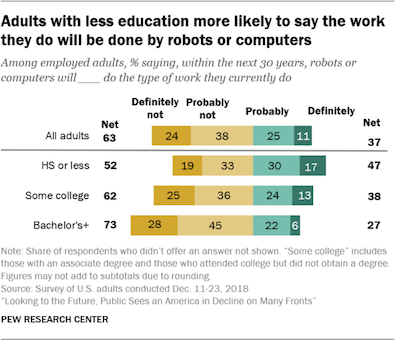The Pew pollsters recently released a new survey about Americans’ dismal view of the nation in three decades: Looking to the Future, Public Sees America in Decline on Many Fronts (full paper in pdf).
Of particular interest here is the public’s increased awareness of the automation revolution while Washington remains on snooze mode about the issue.
Posted below is the online article’s section on automation that’s just three paragraphs and one chart. The question used for the graph is curiously restrictive because it asks whether the respondent’s particular occupation will someday be performed by a robot or some form of technology. A better question would be whether the industrialized world will suffer massive, permanent job loss due to automation and artificial intelligence.
The nature of Pew’s question makes it easy for the pollster to disparage less educated persons when their blue collar jobs are indeed more likely to be endangered by technology at first, although few occupations will escape some effects over the long term. White collar jobs are also disappearing because software is crunching the numbers and text, making fewer humans needed in the office.
The good news is that 82 percent of those polled believe that future workplaces will be “heavily automated.” By comparison, a Gallup survey from August 2017 found that only 13 percent of workers were worried that tech would would eliminate their jobs, so awareness seems to be growing.
Hopefully, more citizens will come to realize that smart machines will change the world and Washington must wake up and smell the software. There should be appropriate education and retraining initiatives that suit the unique challenges of the 21st century. And of course America won’t need millions of unskilled Third Worlders because. . .
Automation makes immigration obsolete
For more details, see section 5. The future of work in the automated workplace, starting on page 48 of the full report. In general, Americans are apprehensive of the techno-future, believing that there will be less job security, and economic inequality will worsen. That’s not surprising since nearly half of adults already think the new technology in the workplace has hurt US workers more than it has helped.
Is anyone listening in Washington??
Looking to the Future, Public Sees an America in Decline on Many Fronts, Pew Social Trends, March 21, 2019
[. . .]
Older adults, those with less education more negative about the impact of automation

While only 37% of all currently employed Americans personally see automation as a direct threat to their current occupation, less well-educated workers are likelier than those with more formal schooling to say the type of work they do will be done by robots or computers in the future. About half (47%) of those with a high school diploma or less education say this change will occur compared with 38% of those with some college experience and 27% of those with a bachelor’s or advanced degree.
Most Americans agree that the workplaces of the future will be heavily automated. About eight-in-ten (82%) predict that robots and computers will do much of the work currently done by humans – a possibility that many adults with less education view with suspicion, if not outright dread. Among those who say robots and computers will do much of the work currently done by humans, about eight-in-ten of those with a high school diploma or less education say this would be a bad thing for the country (39% say it would be very bad; 39% say it would be somewhat bad). Those with a bachelor’s degree or more education are less fearful: Roughly six-in-ten say an automated workplace would be very (13%) or somewhat bad (45%).
Regardless of educational background, most Americans predict that automation in the workplace will increase inequality between the rich and the poor and will not result in new, better-paying jobs.



